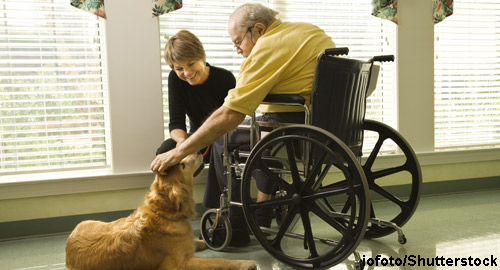 For certain rheumatoid arthritis (RA) patients, having a service dog can provide multiple benefits. Bharat Kumar, MD, MME, RhMSUS, FACP, assistant professor of internal medicine, Division of Immunology, Allergy and Rheumatology at the University of Iowa Hospitals and Clinics, Iowa City, Iowa, has recommended the use of service dogs to patients with fairly severe RA, including those who have difficulty walking, bending or using their shoulders.
For certain rheumatoid arthritis (RA) patients, having a service dog can provide multiple benefits. Bharat Kumar, MD, MME, RhMSUS, FACP, assistant professor of internal medicine, Division of Immunology, Allergy and Rheumatology at the University of Iowa Hospitals and Clinics, Iowa City, Iowa, has recommended the use of service dogs to patients with fairly severe RA, including those who have difficulty walking, bending or using their shoulders.
“Service dogs can offer physical support to an RA patient when they move,” Dr. Kumar says. “Having a service dog can also encourage patients to move more, because they aid with mobility.”
Carol Sneath-Zeiders is an administrative assistant for Canine Partners for Life, Cochranville, Pa., an organization that trains service dogs to assist individuals with physical and cognitive disabilities. She says the organization’s service dogs are fitted with custom harnesses with handles on top. “This [harness] allows the dog to assist someone with balance and stability when walking,” she says, citing feedback from graduates. “With the harness, [a] dog can actually be used instead of a cane or crutch. We have found that individuals tend to fall less with a dog [than with] a cane, because the dog can anticipate when someone starts to lose their balance and help accordingly.”
For people with fatigue, a dog can provide a gentle pull that reduces the amount of energy exerted, Ms. Sneath-Zeiders adds. Service dogs are also trained to pick up items off the ground, reducing the owner’s need to bend over. Additionally, they can carry items, help patients get dressed or undressed, open and close doors, take out the trash, call for help and retrieve specific items or people from another room.
Because RA is associated with loneliness and depression, a service dog can also offer patients companionship. And Dr. Kumar has noticed an improvement in mood for RA patients who have service dogs. When significant evidence of disability and compromise exists for a patient, Dr. Kumar begins considering recommendations for a service dog. He consults with primary care providers, psychiatrists and other members of the patient’s healthcare team to identify patients with emotional challenges. In some cases, the data for using a service dog may be much stronger from a comorbid condition, such as depression, than for RA.
For less severe RA cases, Dr. Kumar may shy away from recommending a service dog because having one may not be necessary for the patient. “Dogs require some upkeep,” he says. “The patient has to weigh the pros and cons. No age restrictions exist to qualify for a service dog, but a patient must be able to care for a dog.”




